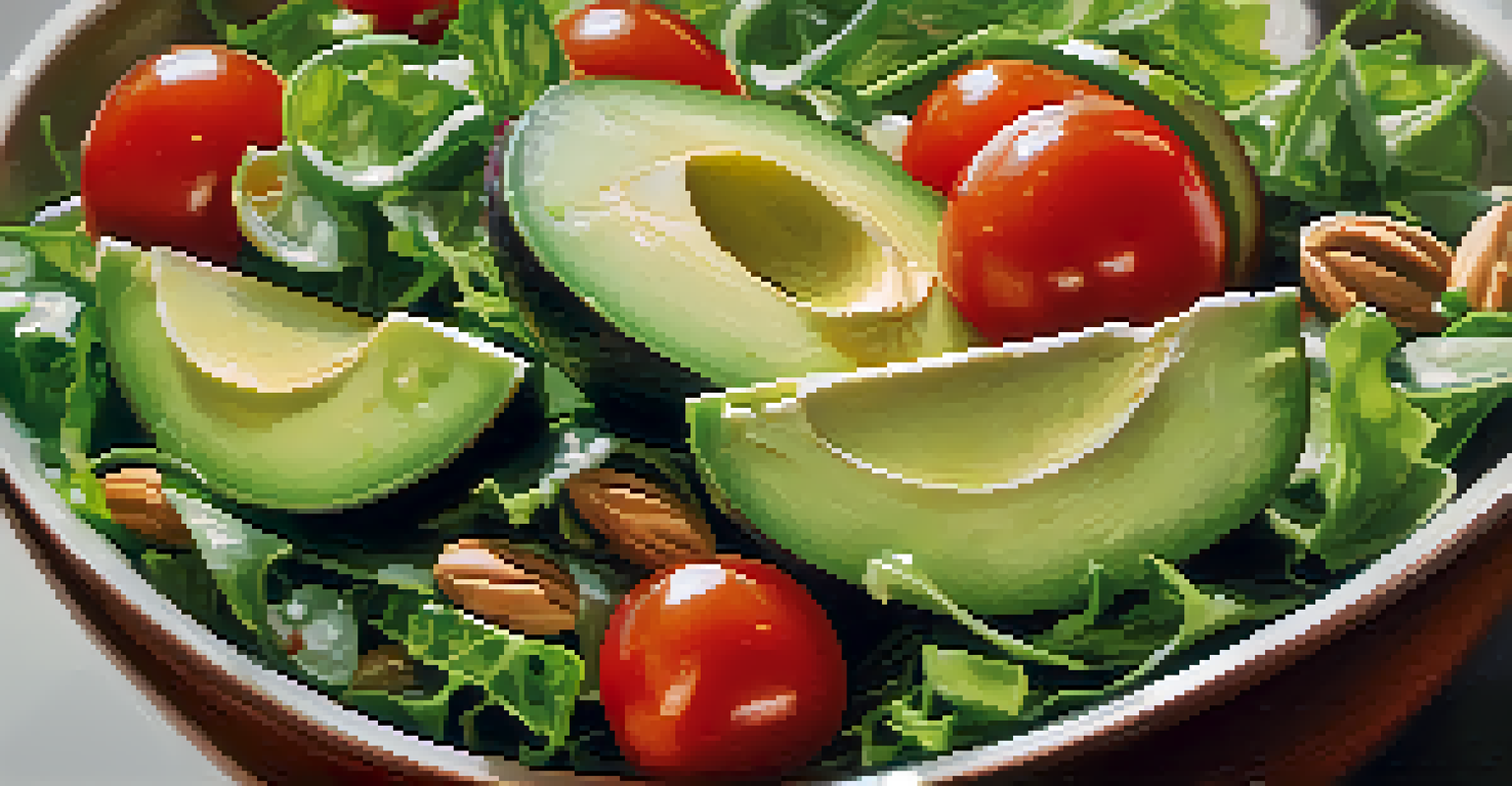The Science Behind Raw Food and Mood Improvement

Understanding Raw Food: What Is It?
Raw food refers to uncooked, unprocessed plant-based foods. This includes fruits, vegetables, nuts, seeds, and sprouted grains, all of which maintain their natural enzymes and nutrients. The idea is that cooking can diminish the nutritional value of these foods, so consuming them raw maximizes their health benefits.
Let food be thy medicine and medicine be thy food.
Advocates of the raw food diet believe that these foods can have a profound impact on our physical health and mental well-being. The vibrant colors and natural flavors of raw ingredients often make meals more enjoyable and visually appealing. Plus, there's something refreshing about biting into a crisp apple or a juicy tomato that cooked foods sometimes lack.
Incorporating raw foods into your diet can be as simple as adding a fresh salad or smoothie to your meals. However, it's important to strike a balance and ensure you're getting all necessary nutrients, as a strictly raw diet may not be suitable for everyone.
The Link Between Food and Mood
Numerous studies suggest that what we eat has a direct impact on our mood and mental health. For example, diets high in processed foods and sugars have been linked to higher levels of anxiety and depression. Conversely, nutrient-rich diets, like those including raw foods, may promote a more stable mood and better overall mental health.

Raw foods are rich in vitamins, minerals, and antioxidants, which can help combat oxidative stress in the body. Oxidative stress occurs when there's an imbalance between free radicals and antioxidants, potentially leading to mood disorders. Eating a variety of colorful fruits and veggies can help ensure you're getting a broad range of these essential nutrients.
Raw Foods Enhance Mood and Health
Incorporating raw foods into your diet can improve both physical health and mental well-being.
Moreover, foods that are high in Omega-3 fatty acids—like flaxseeds and walnuts—found in some raw diets, have been shown to support brain health and improve mood. This connection highlights why choosing the right foods can be a vital part of managing emotional well-being.
How Raw Foods Impact Brain Chemistry
Our brain chemistry plays a crucial role in regulating mood and emotions. Certain nutrients in raw foods can influence the production of neurotransmitters, the chemicals that transmit signals in the brain. For instance, foods rich in amino acids, like those found in nuts and seeds, are essential for the production of serotonin, often called the 'happiness hormone.'
The food you eat can either be the safest and most powerful form of medicine or the slowest form of poison.
Additionally, raw fruits and vegetables contain high levels of fiber, which can support gut health. There's a growing body of research suggesting that a healthy gut microbiome can positively affect our mental health. It’s often referred to as the gut-brain connection, highlighting how what we eat can influence our mood.
By choosing raw foods, you're not just nourishing your body; you're also giving your brain the nutrients it needs to function optimally. This dual benefit can lead to improved mood and cognitive function, making it easier to tackle daily challenges.
The Role of Antioxidants in Mood Improvement
Antioxidants are compounds that help fight oxidative stress and inflammation, which can negatively impact our mood. Raw foods, particularly fruits and vegetables, are packed with antioxidants. Berries, for example, are not only delicious but also incredibly high in antioxidants that can boost brain health and mood.
When we consume raw foods rich in antioxidants, we may experience reduced feelings of anxiety and stress. This is because antioxidants help mitigate the effects of inflammation in the brain, which has been linked to mood disorders. Foods like kale, spinach, and avocados are excellent sources of these beneficial compounds.
Antioxidants Boost Brain Function
Raw foods are rich in antioxidants, which can reduce anxiety and support brain health.
Incorporating a variety of raw foods into your diet can create a powerful combination that supports not just physical health, but mental health as well. It’s about building a vibrant plate that fuels your body and mind, setting a positive tone for your day.
Hydration and Its Effect on Mood
Hydration is a vital yet often overlooked component of mood regulation. Many raw foods, such as cucumbers, watermelon, and leafy greens, have high water content, which can help keep you hydrated. Proper hydration is essential for maintaining energy levels and cognitive function, both of which influence mood.
Even mild dehydration can lead to feelings of fatigue, irritability, and difficulty concentrating. By including raw foods in your diet, you not only nourish your body with essential nutrients but also help maintain optimal hydration levels. This can lead to a more stable mood throughout the day.
So, next time you're feeling a bit off, consider reaching for a refreshing raw salad or a smoothie packed with hydrating fruits. It might just be the mood boost you need!
Practical Tips for Incorporating Raw Foods
Making the switch to more raw foods doesn’t have to be daunting. Start by adding a raw fruit or vegetable to every meal. For example, toss some fresh spinach into your morning smoothie or snack on carrot sticks in the afternoon. These small changes can gradually increase your intake of raw foods without feeling overwhelming.
You can also experiment with raw food recipes that are both delicious and satisfying. From zesty salads to flavorful raw dips and desserts, there are countless ways to enjoy the benefits of raw ingredients. Consider joining a local raw food community or following online groups for inspiration.
Hydration Supports Emotional Stability
Many raw foods help maintain hydration, which is crucial for regulating mood and cognitive function.
Another great tip is to prepare meals ahead of time. By having raw snacks readily available, you'll be more likely to choose them over processed options when hunger strikes. This proactive approach can help you maintain a balanced diet that supports your mood.
Listening to Your Body: Finding Balance
While raw foods offer numerous benefits, it’s essential to listen to your body and find a balance that works for you. Everyone's nutritional needs are different, and some people may thrive on a higher ratio of raw foods, while others may require more cooked options. Pay attention to how different foods make you feel physically and emotionally.
Incorporating raw foods should enhance your overall well-being, not create stress around eating. If you find that certain raw foods don’t sit well with you, it’s perfectly okay to adjust your diet accordingly. The key is to cultivate a positive relationship with food that supports your mood and health.

Ultimately, the goal is to create a sustainable eating pattern that nourishes your body and mind. By being mindful of your choices and how they impact your mood, you can create a diet that feels good and supports your emotional well-being.